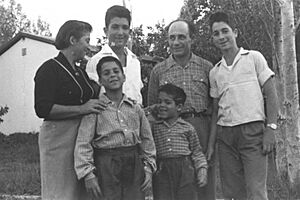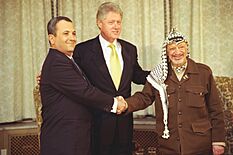Ehud Barak facts for kids
Quick facts for kids
Ehud Barak
|
|
|---|---|
|
אֵהוּד בָּרָק
|
|
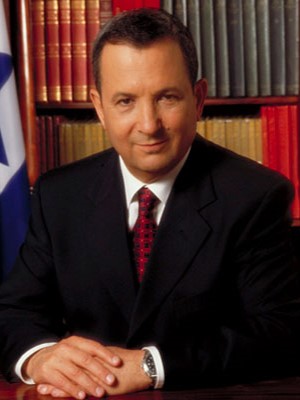
Official portrait, 1999
|
|
| Prime Minister of Israel | |
| In office 6 July 1999 – 7 March 2001 |
|
| President | Ezer Weizman Moshe Katsav |
| Deputy | Yitzhak Mordechai David Levy Binyamin Ben-Eliezer |
| Preceded by | Benjamin Netanyahu |
| Succeeded by | Ariel Sharon |
| Minister of Defense | |
| In office 18 June 2007 – 18 March 2013 |
|
| Prime Minister | Ehud Olmert Benjamin Netanyahu |
| Deputy | Matan Vilnai |
| Preceded by | Amir Peretz |
| Succeeded by | Moshe Ya'alon |
| In office 6 July 1999 – 7 March 2001 |
|
| Prime Minister | Himself |
| Deputy | Efraim Sneh |
| Preceded by | Moshe Arens |
| Succeeded by | Binyamin Ben-Eliezer |
| Minister of Foreign Affairs | |
| In office 22 November 1995 – 18 June 1996 |
|
| Prime Minister | Shimon Peres |
| Deputy | Eli Dayan |
| Preceded by | Shimon Peres |
| Succeeded by | David Levy |
| Chief of General Staff | |
| In office 1 April 1991 – 1 January 1995 |
|
| President | Chaim Herzog Ezer Weizman |
| Prime Minister | Yitzhak Shamir Yitzhak Rabin |
| Deputy | Amnon Lipkin-Shahak Matan Vilnai |
| Minister | Moshe Arens Yitzhak Rabin |
| Preceded by | Dan Shomron |
| Succeeded by | Amnon Lipkin-Shahak |
| Personal details | |
| Born |
Ehud Brog
12 February 1942 Mishmar HaSharon, Mandatory Palestine |
| Political party | Israel Democratic Party |
| Other political affiliations |
Labor Party (until 2011) Independence (2011–2012) Independent (2012–2019) |
| Spouses |
|
| Children | 3 |
| Education | Hebrew University of Jerusalem (BSc) Stanford University (MS) |
| Profession | Military officer |
| Awards |
|
| Signature | |
| Military service | |
| Branch | Israeli Defense Forces |
| Service years | 1959–1995 |
| Rank | Rav Aluf (Lieutenant general) |
| Unit | Sayeret Matkal |
| Commands | Chief of General Staff Deputy Chief of General Staff Central Command Military Intelligence Directorate Sayeret Matkal |
| Wars / operations | Six-Day War Yom Kippur War Entebbe raid |
Ehud Barak (born Ehud Brog on February 12, 1942) is an Israeli former general and politician. He served as the Prime Minister of Israel from 1999 to 2001. He was also the leader of the Israeli Labor Party for several years.
Barak had a long and distinguished career in the Israel Defense Forces (IDF). He later became involved in politics, holding important roles like Minister of Defense and Minister of Foreign Affairs. He is known for his military achievements and his efforts in peace negotiations.
Contents
Early Life and Education
Ehud Barak was born on a kibbutz called Mishmar HaSharon in what was then Mandatory Palestine. He was the oldest of four sons. His family faced great hardship; his paternal grandparents were killed in Lithuania in 1912. His maternal grandparents died during the Holocaust.
In 1972, Ehud changed his family name from "Brog" to "Barak." He met his first wife, Nava, during his military service. They had three daughters together. Later, he married Nili Priel in 2007. Barak enjoys reading and is a talented classical pianist.
He studied at the Hebrew University of Jerusalem, earning a bachelor's degree in physics and mathematics in 1968. He then went on to get a master's degree in engineering from Stanford University in California in 1978.
Military Career and Achievements
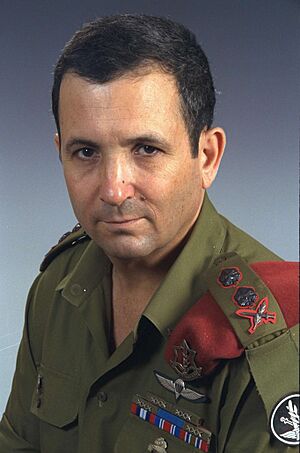
Barak joined the Israel Defense Forces (IDF) in 1959. He served for 35 years, reaching the highest rank in the Israeli military, Rav Aluf (Lieutenant-General). He became the Chief of the General Staff in 1991, serving until 1995.
During his time as a commando in the special unit Sayeret Matkal, Barak led several important operations. These included "Operation Isotope" in 1972, which freed hostages on a hijacked plane. He also played a key role in the 1976 Entebbe raid, another mission to rescue hostages from a hijacked aircraft in Uganda. These operations helped stop terrorist groups.
Barak also served in major conflicts like the Yom Kippur War. He commanded different military units and later headed the Military Intelligence Directorate. He was also the Deputy Chief of the General Staff before becoming the Chief. During his leadership, he helped put into action the first Oslo Accords and worked on the Israel–Jordan peace treaty.
For his bravery and excellent service, Barak received the Medal of Distinguished Service and four Chief of Staff citations. These five awards make him one of the most decorated soldiers in Israel's history. He also received awards from the United States, including the Legion of Merit.
Political Journey
Barak began his political career in 1995 when he was appointed Minister of Internal Affairs. After Prime Minister Yitzhak Rabin was assassinated, Barak became the Minister of Foreign Affairs under Shimon Peres. In 1996, he was elected to the the Knesset (Israel's parliament) and later became the leader of the Labor Party.
Serving as Prime Minister
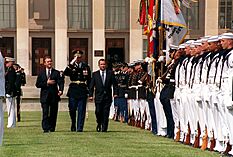
In 1999, Ehud Barak was elected Prime Minister of Israel, defeating Benjamin Netanyahu. During his time as Prime Minister, he made several important decisions. In May 2000, Israel withdrew its forces from Southern Lebanon, fulfilling a campaign promise.
His government also continued peace talks with the PLO. Barak took part in the Camp David 2000 Summit, which aimed to resolve the Israeli–Palestinian conflict. Although the summit did not lead to a final agreement, it was a significant effort towards peace. His time as Prime Minister also saw challenges, including protests in October 2000.
In 2001, Barak called for an early election for Prime Minister. He was defeated by Ariel Sharon and then resigned from his leadership roles.
Return to Public Service
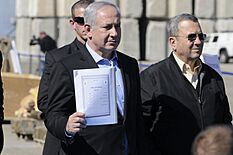
After leaving politics for a few years, Barak returned in 2005. He ran for leadership of the Labor Party again. In 2007, he successfully regained the leadership of the Labor Party.
As part of Prime Minister Ehud Olmert's government, Barak was sworn in as Minister of Defense in June 2007. In this role, he led the Israel Defense Forces during Operation Cast Lead from December 2008 to January 2009.
In 2009, the Labor Party joined a new government coalition led by Benjamin Netanyahu, and Barak continued to serve as Defense Minister. In 2011, he formed a new political party called Independence. He retired from politics in 2012.
In 2019, Barak announced his return to politics once more, forming a new party called the Israel Democratic Party. This party joined an alliance for the September 2019 Israeli legislative election, but Barak did not win a seat in the Knesset.
Images for kids
See also
 In Spanish: Ehud Barak para niños
In Spanish: Ehud Barak para niños
 | Jackie Robinson |
 | Jack Johnson |
 | Althea Gibson |
 | Arthur Ashe |
 | Muhammad Ali |


